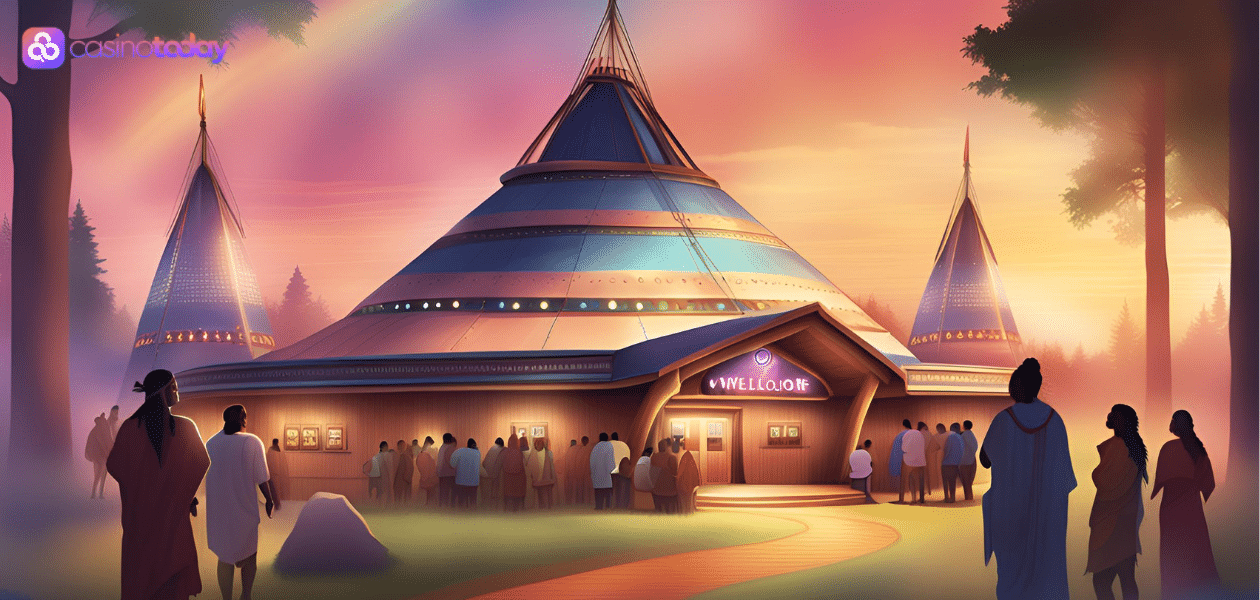Last updated: December 16, 2024

The Mashpee Wampanoag Tribe in Massachusetts is set to build a welcome center on its Taunton land. The center will celebrate tribal culture and preview the proposed First Light resort, a $1 billion casino project stalled by federal and state hurdles.
The Mashpee Wampanoag Tribe, one of Massachusetts’ two federally recognized tribes, has unveiled plans for a welcome center on its sovereign land in Taunton.
Of the two federally recognized tribes from Massachusetts, Mashpee got its federal recognition in 2007, even though they can trace their ancestry to the tribe who broke bread with the Pilgrims at that first Thanksgiving. The Native community has worked more than ten years for this goal of being a gaming tribe, and this would develop a $1 billion resort destination called First Light.
The tribe lost a major funding source from the Malaysian gaming corporation Genting, as the Bureau of Indian Affairs within the US Department of the Interior has had conflicted views under three presidential administrations as to whether the Mashpee’s 321 acres of land in Taunton are eligible to be put into federal trust.
Leaders in Mashpee still claim to be committed to opening a tribal casino, but statewide officials in Boston and state Governor Maura Healey, D, say the commonwealth is opposed to the tribe entering into Class III gaming compact that could put Las Vegas-style slot machines, live dealer table games and sports betting at the First Light property.
The tribe this week announced that it is preparing a small section of the First Light land for the establishment of a welcome center.
This project is a requirement that has been called from all parties involved including Tribal citizens, residents and, of course, the City of Taunton. “It is a place to discover our past, interact with our culture and envision our future directions for our reservation,” Mashpee Wampanoag Chairman Brian Weeden told the media.
“The new Welcome Center is the first step in a multi-step process to help bring First Light resort and entertainment project to life. This facility will be used to promote the benefits of the project First Light, as well as to demonstrate the idea of tribal stewardship of our land,” Weeden said.
The tribal welcome center will display the First Light development and highlight the benefits that a resort like this could offer, such as job opportunities and increased tax revenue.
The Mashpees and Genting started constructing First Light in early 2016 after the Department of the Interior took into federal trust 321 acres of land in 2015. Construction was put to an abrupt end due to a legal challenge initiated by some residents against the tribal resort.
Billionaire Neil Bluhm, linked to Rush Street Gaming, bankrolled the litigation over the single commercial casino license granted to the counties of Bristol, Plymouth, Nantucket, Dukes, and Barnstable in southeastern Massachusetts. Rush Street had proposed a full-scale $677 million redevelopment of the Brockton Fairgrounds.
On June 2016, the federal judge ruled that the DOI and BIA were wrong in accepting the land because the case rested on the basis of the Indian Reorganization Act of 1934, which holds that newly acquired lands may only be placed into trust for tribes which had already been recognized at the time of passage of the law. President Donald Trump’s DOI had reinstated US District Judge William Young’s verdict. Massachusetts Sen. Elizabeth Warren offered unsuccessful legislation in Congress which proposed an affirmative of the decision rendered 2015.
The DOI under President Joe Biden again overturned the land-into-trust decision. Taunton residents, who had appealed the BIA reversal, were unsuccessful, and the US Supreme Court decided in April of 2024 that the land should remain in trust.
The Massachusetts Gaming Commission would not grant the commercial license for the southeastern region to the commercial casino due to saturation that would be incurred if a tribal casino had been constructed in Taunton. As such, therefore, the state’s tax revenues and economic benefits of the 2011 Expanded Gaming Act are presumably reduced now that there are three rather than four casinos.